Print Edition: January 29, 2014
We’ve been Sherlocked once again!
The third season of BBC’s Sherlock premiered January 1 this year and ended in the blink of an eye on January 12. The three episodes, each around an hour and a half long — “The Empty Hearse,” “The Sign of Three,” and “His Last Vow” had me laughing, crying, and picking my jaw up off the floor.
Benedict Cumberbatch plays Sherlock Holmes, the mastermind detective and self-proclaimed “high-functioning sociopath” as always in the show. From his inhuman intelligence and perception to his unknowingly Machiavellian treatment of others, he is truly a unique individual. Sherlock would be perfectly content never loving another human being as long as his mind was amused. From playing the violin, dissecting eyeballs, solving Inspector LeStrade’s cases and occasionally shooting up (supposedly a past hobby), this man clearly has no respect for the social norm. Though the new season of the BBC hit show has thrown a new challenge at Cumberbatch, a new side to the ever so logical Sherlock Holmes is revealed, a more emotional and less self-centred side — a weaker side, you might say, one we have only seen vaguely in previous seasons of the show.
Martin Freeman does an outstanding job playing Dr. Watson, Sherlock’s more human counterpart. Watson, a former army doctor, met Holmes through a mutual acquaintance who set them up together with a flat; in the new season Watson is to be married to Mary Morstan, this is the first time we see Sherlock really fear for his friendship. In fact Sherlock is surprised to be considered someone’s friend, although the two of them became quite close in the previous seasons, solving cases together, saving each other’s lives, and mourning over those lost. Sherlock maybe not mourning but rather regretting his failure to succeed in solving cases perfectly without casualties; Watson in previous episodes is the one attempting to save lives and suffering from the emotional backlash. Holmes repeatedly acknowledges this idea in the third season: that while he may be able to solve a case, it is always Watson who saves the life.
The contrast of the protagonists in the show and their compelling interactions is not the only thing that keeps fans’ eyes glued to the screen. The less focused on but just as important supporting characters in Sherlock are just as unique, intelligent, and even more mysterious than Holmes and Watson. The villains of Sherlock, his intellectual equals, seem to be the first true super-geniuses when it comes to antagonists. Instead of trying to tie up and kill the hero after telling him their magnificent plan to destroy the earth, these villains are far more cunning. They seek to destroy hope, reputation, and sanity and do it in such a cool and collected manner and with a devious intelligence only Sherlock (and possibly his brother) could counter.
Charles Augusts Magnussen, the third season’s villain, brings a whole new meaning to disturbing. He gathers and uses people’s emotional weak points or what he calls “pressure points” to exploit their positions of power. He pokes at people, torments them with threats to expose pieces of their dark pasts, and makes them his slaves through blackmail. Despite Sherlock’s equally genius but more mature brother Mycroft’s attempts to keep him away, when Magnussen gets Watson involved in his emotional torture, all hell breaks loose.
Of course it can’t just end there; the season once again leaves you dumbfounded and waiting for more, according to writer Steven Moffat, season four is already mapped out. After a writers meeting, Moffat announced at the BAFTA season three screening, “The ideas we had that day, I thought were the best we’ve ever had.” Just when fans thought it couldn’t get any better! If you have not jumped on the Sherlockian bandwagon and you are looking for a good show to watch, this is it! I will warn you though: one episode and you’ll be hooked.


